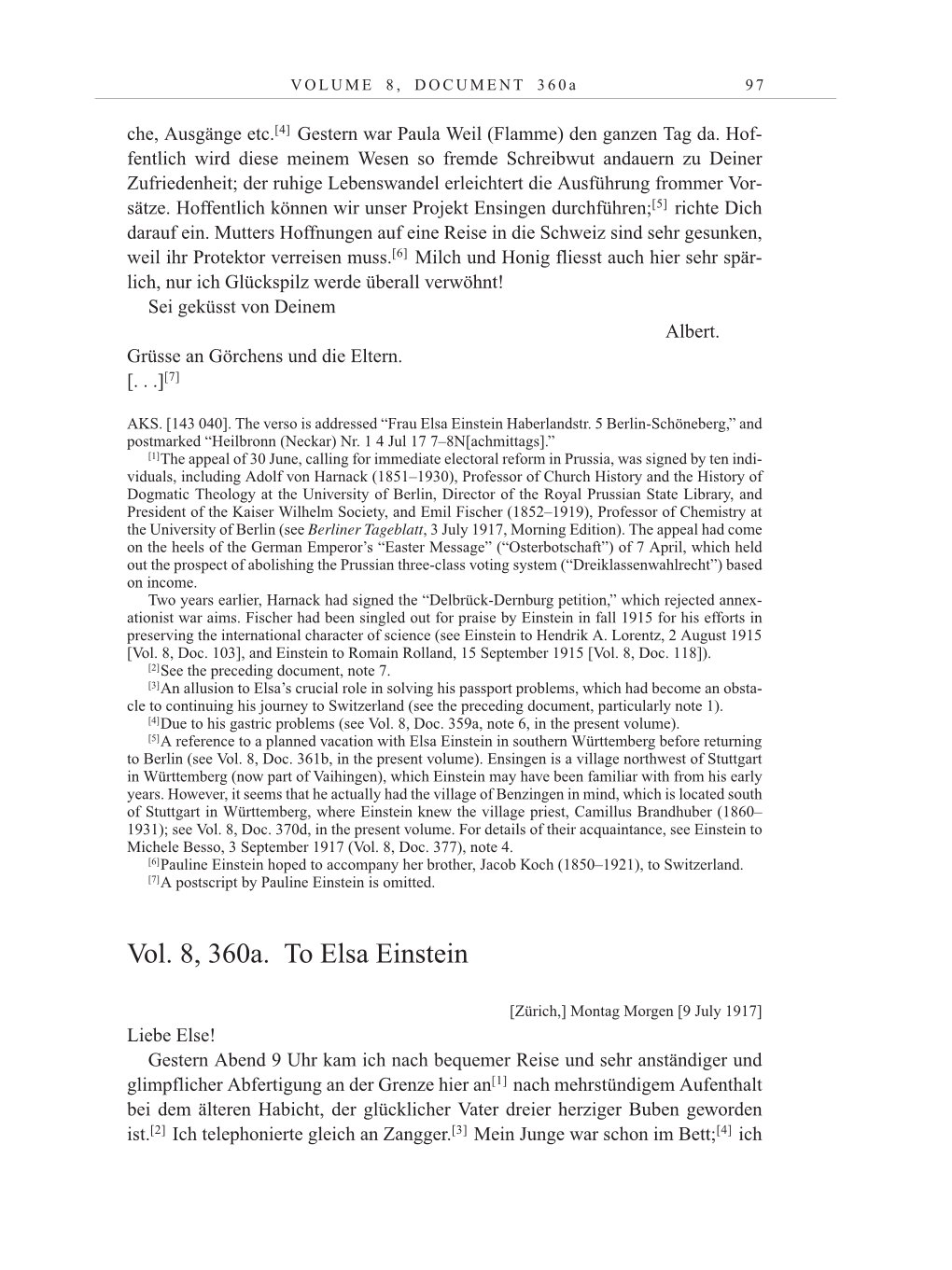V O L U M E 8 , D O C U M E N T 3 6 0 a 9 7
che, Ausgänge
etc.[4]
Gestern war Paula Weil (Flamme) den ganzen Tag da. Hof-
fentlich wird diese meinem Wesen so fremde Schreibwut andauern zu Deiner
Zufriedenheit; der ruhige Lebenswandel erleichtert die Ausführung frommer Vor-
sätze. Hoffentlich können wir unser Projekt Ensingen
durchführen;[5]
richte Dich
darauf ein. Mutters Hoffnungen auf eine Reise in die Schweiz sind sehr gesunken,
weil ihr Protektor verreisen
muss.[6]
Milch und Honig fliesst auch hier sehr spär-
lich, nur ich Glückspilz werde überall verwöhnt!
Sei geküsst von Deinem
Albert.
Grüsse an Görchens und die Eltern.
[. .
.][7]
AKS. [143 040]. The verso is addressed “Frau Elsa Einstein Haberlandstr. 5 Berlin-Schöneberg,” and
postmarked “Heilbronn (Neckar) Nr. 1 4 Jul 17 7–8N[achmittags].”
[1]The appeal of 30 June, calling for immediate electoral reform in Prussia, was signed by ten indi-
viduals, including Adolf von Harnack (1851–1930), Professor of Church History and the History of
Dogmatic Theology at the University of Berlin, Director of the Royal Prussian State Library, and
President of the Kaiser Wilhelm Society, and Emil Fischer (1852–1919), Professor of Chemistry at
the University of Berlin (see Berliner Tageblatt, 3 July 1917, Morning Edition). The appeal had come
on the heels of the German Emperor’s “Easter Message” (“Osterbotschaft”) of 7 April, which held
out the prospect of abolishing the Prussian three-class voting system (“Dreiklassenwahlrecht”) based
on income.
Two years earlier, Harnack had signed the “Delbrück-Dernburg petition,” which rejected annex-
ationist war aims. Fischer had been singled out for praise by Einstein in fall 1915 for his efforts in
preserving the international character of science (see Einstein to Hendrik A. Lorentz, 2 August 1915
[Vol. 8, Doc. 103], and Einstein to Romain Rolland, 15 September 1915 [Vol. 8, Doc. 118]).
[2]See the preceding document, note 7.
[3]An allusion to Elsa’s crucial role in solving his passport problems, which had become an obsta-
cle to continuing his journey to Switzerland (see the preceding document, particularly note 1).
[4]Due to his gastric problems (see Vol. 8, Doc. 359a, note 6, in the present volume).
[5]A reference to a planned vacation with Elsa Einstein in southern Württemberg before returning
to Berlin (see Vol. 8, Doc. 361b, in the present volume). Ensingen is a village northwest of Stuttgart
in Württemberg (now part of Vaihingen), which Einstein may have been familiar with from his early
years. However, it seems that he actually had the village of Benzingen in mind, which is located south
of Stuttgart in Württemberg, where Einstein knew the village priest, Camillus Brandhuber (1860–
1931); see Vol. 8, Doc. 370d, in the present volume. For details of their acquaintance, see Einstein to
Michele Besso, 3 September 1917 (Vol. 8, Doc. 377), note 4.
[6]Pauline Einstein hoped to accompany her brother, Jacob Koch (1850–1921), to Switzerland.
[7]A postscript by Pauline Einstein is omitted.
Vol. 8, 360a. To Elsa Einstein
[Zürich,] Montag Morgen [9 July 1917]
Liebe Else!
Gestern Abend 9 Uhr kam ich nach bequemer Reise und sehr anständiger und
glimpflicher Abfertigung an der Grenze hier
an[1]
nach mehrstündigem Aufenthalt
bei dem älteren Habicht, der glücklicher Vater dreier herziger Buben geworden
ist.[2]
Ich telephonierte gleich an
Zangger.[3]
Mein Junge war schon im
Bett;[4]
ich
